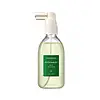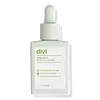What's inside
What's inside
 Key Ingredients
Key Ingredients

 Benefits
Benefits

 Concerns
Concerns

 Ingredients Side-by-side
Ingredients Side-by-side

Alcohol Denat.
AntimicrobialRosmarinus Officinalis Leaf Extract
AntimicrobialPinus Densiflora Leaf Extract
AntimicrobialWater
Skin ConditioningRosmarinus Officinalis Leaf Oil
MaskingZingiber Officinale Root Extract
MaskingBifida Ferment Lysate
Skin ConditioningLactobacillus Ferment Lysate
Skin ConditioningCaffeine
Skin ConditioningPanthenol
Skin ConditioningBiotin
AntiseborrhoeicThiamine Hcl
MaskingPyridoxine Hcl
Skin ConditioningAscorbic Acid
AntioxidantMenadione
MaskingRiboflavin
Cosmetic ColorantOryza Sativa Extract
AbsorbentGlycine Soja Seed Extract
Skin ConditioningSesamum Indicum Seed Extract
Skin ConditioningSolanum Melongena Fruit Extract
Skin ConditioningMorus Alba Fruit Extract
AntioxidantPiper Nigrum Seed Extract
RefreshingSalicylic Acid
MaskingLavandula Angustifolia Oil
MaskingMenthol
MaskingGlycerin
HumectantEthylhexylglycerin
Skin ConditioningCitrus Aurantium Dulcis Peel Oil
MaskingMentha Viridis Leaf Oil
AstringentMelia Azadirachta Leaf Extract
Skin ConditioningMelia Azadirachta Flower Extract
Skin ConditioningGeraniol
PerfumingLimonene
PerfumingLinalool
Perfuming1,2-Hexanediol
Skin ConditioningBenzyl Glycol
SolventAlcohol Denat., Rosmarinus Officinalis Leaf Extract, Pinus Densiflora Leaf Extract, Water, Rosmarinus Officinalis Leaf Oil, Zingiber Officinale Root Extract, Bifida Ferment Lysate, Lactobacillus Ferment Lysate, Caffeine, Panthenol, Biotin, Thiamine Hcl, Pyridoxine Hcl, Ascorbic Acid, Menadione, Riboflavin, Oryza Sativa Extract, Glycine Soja Seed Extract, Sesamum Indicum Seed Extract, Solanum Melongena Fruit Extract, Morus Alba Fruit Extract, Piper Nigrum Seed Extract, Salicylic Acid, Lavandula Angustifolia Oil, Menthol, Glycerin, Ethylhexylglycerin, Citrus Aurantium Dulcis Peel Oil, Mentha Viridis Leaf Oil, Melia Azadirachta Leaf Extract, Melia Azadirachta Flower Extract, Geraniol, Limonene, Linalool, 1,2-Hexanediol, Benzyl Glycol
Water
Skin ConditioningGlycerin
HumectantMelaleuca Alternifolia Leaf Oil
AntioxidantAcetyl Tetrapeptide-3
Skin ProtectingCopper Tripeptide-1
Skin ConditioningCaffeine
Skin ConditioningSodium PCA
HumectantSodium Lactate
BufferingArginine
MaskingHyaluronic Acid
HumectantAspartic Acid
MaskingPCA
HumectantBiotin
AntiseborrhoeicGlycine
BufferingAlanine
MaskingMentha Piperita Oil
MaskingEucalyptus Globulus Oil
Serine
MaskingMenthol
MaskingTocopherol
AntioxidantValine
MaskingProline
Skin ConditioningThreonine
Isoleucine
Skin ConditioningRosmarinus Officinalis Leaf Extract
AntimicrobialCamellia Sinensis Leaf Extract
AntimicrobialHistidine
HumectantPhenylalanine
MaskingCopper Gluconate
Skin ConditioningAscorbic Acid
AntioxidantPhenylpropanol
MaskingEthylhexylglycerin
Skin ConditioningWater, Glycerin, Melaleuca Alternifolia Leaf Oil, Acetyl Tetrapeptide-3, Copper Tripeptide-1, Caffeine, Sodium PCA, Sodium Lactate, Arginine, Hyaluronic Acid, Aspartic Acid, PCA, Biotin, Glycine, Alanine, Mentha Piperita Oil, Eucalyptus Globulus Oil, Serine, Menthol, Tocopherol, Valine, Proline, Threonine, Isoleucine, Rosmarinus Officinalis Leaf Extract, Camellia Sinensis Leaf Extract, Histidine, Phenylalanine, Copper Gluconate, Ascorbic Acid, Phenylpropanol, Ethylhexylglycerin
 Reviews
Reviews

Alternatives
Ingredients Explained
These ingredients are found in both products.
Ingredients higher up in an ingredient list are typically present in a larger amount.
Ascorbic Acid is is pure Vitamin C. This form makes up the largest amount of vitamin C found naturally in our skin.
Not only is vitamin C great for your overall health and immune system, it also has plenty of benefits on your skin.
Vitamin C is best used for brightening skin. It improves dark spots, acne scars, and hyperpigmentation. This is because it blocks the process of skin darkening when exposed to UV.
Remember: Vitamin C should not replace sunscreen!
Your skin uses vitamin C to build collagen. Collagen is one key component in having a strong skin barrier and plump skin. Vitamin C also plays a role in regulating collagen, thus making it effective in improving wrinkles and fine lines.
Ascorbic acid shows potent antioxidant activity. As an antioxidant, it helps fight free-radicals. Free-radicals are molecules that may damage your skin cells. These antioxidants also protect skin against UV damage.
The best formulations include Vitamin E and/or ferulic acid. These two ingredients help stabilize and provide a boost in the benefits of ascorbic acid. This is because ascorbic acid becomes unstable when exposed to UV and air. In fact, you can tell your ascorbic acid has oxidized when it turns an orange-yellow color.
Ascorbic acid is generally compatible with other ingredients. However, using ascorbic acid with other active ingredients might cause irritation. Two ingredients: copper ions and benzoyl peroxide, will inactivate ascorbic acid completely.
Read more about other types of Vitamin C:
Foods rich with vitamin C include oranges, strawberries, broccoli, bell peppers, and more. When consuming Vitamin C, your skin receives a portion of the nutrients.
Learn more about Ascorbic AcidBiotin is a B vitamin that is naturally produced by our bodies. It is also called Vitamin H.
Our bodies use biotin in the metabolism process. It also helps our bodies use enzymes and move nutrients around. A biotin deficiency can lead to brittle hair and nails.
More research is needed on applying biotin topically. However, taking biotin orally has been shown to help nourish the skin, hair, and nails. They play a role in forming skin-hydrating fatty acids.
Biotin is water-soluble. It can be found in foods such as fish, eggs, dairy, nuts, and meat. Vitamin H stands for "haar" and "haut". These are the German words for hair and skin.
Learn more about BiotinCaffeine is most associated with coffee, tea, and cacao. In skincare, it helps with calming inflammation and is rich in antioxidants.
While caffeine is used to treat cellulite and and dark circles, further studies are needed to prove this. It has been believed to help with these skin conditions due to its ability to dilate blood vessels and increase blood flow.
Some studies are looking into caffeine's ability to protect against UV rays.
Learn more about CaffeineEthylhexylglycerin (we can't pronounce this either) is commonly used as a preservative and skin softener. It is derived from glyceryl.
You might see Ethylhexylglycerin often paired with other preservatives such as phenoxyethanol. Ethylhexylglycerin has been found to increase the effectiveness of these other preservatives.
Glycerin is already naturally found in your skin. It helps moisturize and protect your skin.
A study from 2016 found glycerin to be more effective as a humectant than AHAs and hyaluronic acid.
As a humectant, it helps the skin stay hydrated by pulling moisture to your skin. The low molecular weight of glycerin allows it to pull moisture into the deeper layers of your skin.
Hydrated skin improves your skin barrier; Your skin barrier helps protect against irritants and bacteria.
Glycerin has also been found to have antimicrobial and antiviral properties. Due to these properties, glycerin is often used in wound and burn treatments.
In cosmetics, glycerin is usually derived from plants such as soybean or palm. However, it can also be sourced from animals, such as tallow or animal fat.
This ingredient is organic, colorless, odorless, and non-toxic.
Glycerin is the name for this ingredient in American English. British English uses Glycerol/Glycerine.
Learn more about GlycerinMenthol is a compound found in mint plants, such as peppermint. In its pure form, it is a clear crystalline substance.
Menthol is known for its cooling sensation; however, the cooling is actually from your skin being sensitized. Menthol can worsen rosacea. We recommend speaking with a professional if you have concerns.
Menthol also has antimicrobial properties.
Learn more about MentholRosmarinus Officinalis Leaf Extract comes from rosemary. Rosemary is native to the Mediterranean.
While Rosmarinus Officinalis Leaf Oil can be volatile due to its fragrant properties, the fragrance components are usually removed in the leaf extract.
Rosemary Leaf Extract contains many antioxidants such as rosmarinic acid and caffeic acid. Rosemarinic acid, a compound found in rosemary leaf, has been found to help soothe skin conditions such as eczema and acne.
Learn more about Rosmarinus Officinalis Leaf ExtractWater. It's the most common cosmetic ingredient of all. You'll usually see it at the top of ingredient lists, meaning that it makes up the largest part of the product.
So why is it so popular? Water most often acts as a solvent - this means that it helps dissolve other ingredients into the formulation.
You'll also recognize water as that liquid we all need to stay alive. If you see this, drink a glass of water. Stay hydrated!
Learn more about Water